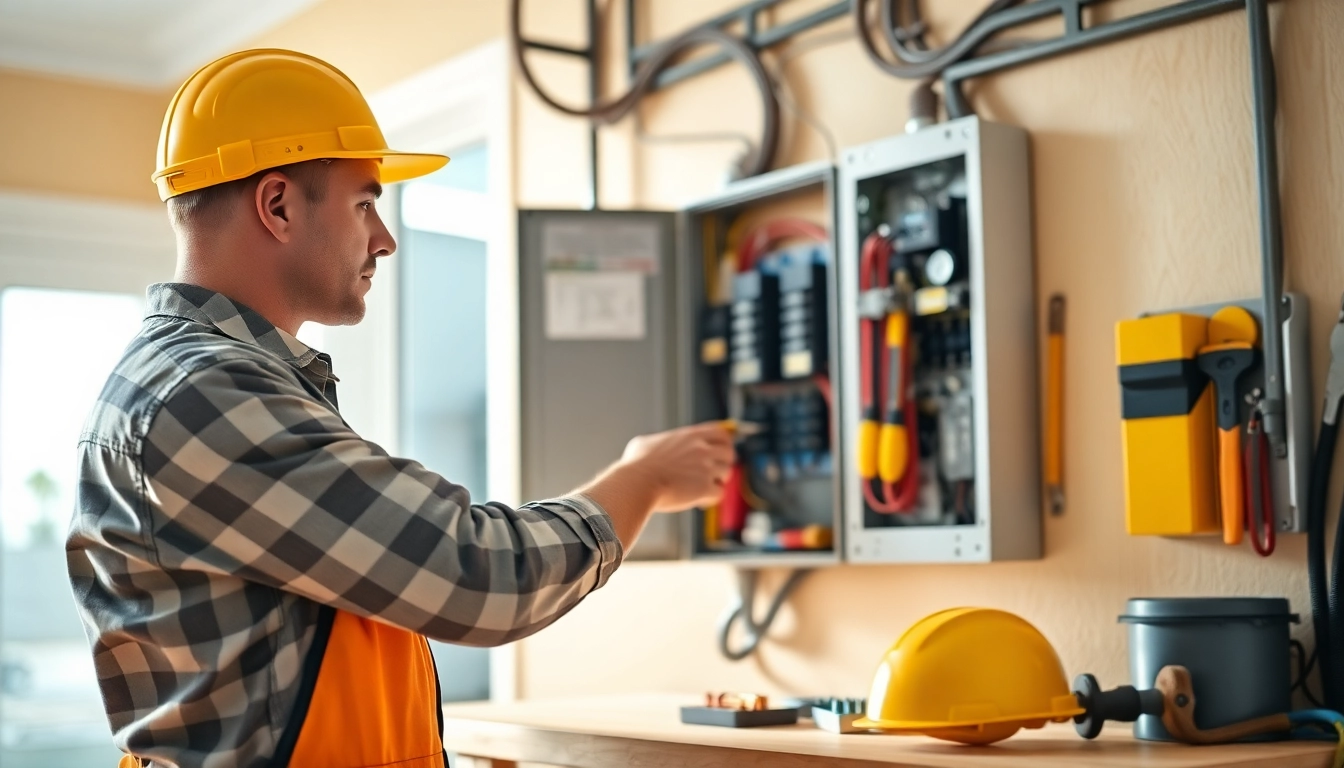
Understanding the Role of an Electrical Contractor Clearwater
In Clearwater, Florida, homeowners and businesses often find themselves in need of professional electrical services. This is where an Electrical Contractor Clearwater plays a crucial role. These professionals are equipped with the necessary expertise, skills, and licenses to handle a wide range of electrical tasks, ensuring safety and compliance with local codes. In this article, we’ll delve into the various aspects of hiring an electrical contractor, common electrical issues, safety precautions, and future trends that impact the industry.
What Services Do Electrical Contractors Offer?
Electrical contractors provide a comprehensive array of services tailored to meet both residential and commercial needs. Here are some of the primary services they offer:
- Installation Services: This includes setting up new electrical systems, wiring for new constructions, and upgrading existing systems. They also handle the installation of lighting fixtures, switches, and outlets.
- Repair Services: Electrical contractors are called upon to troubleshoot and fix various problems, such as faulty wiring, circuit breakers, and malfunctioning outlets.
- Maintenance: Regular maintenance is vital to ensure the longevity and efficiency of electrical systems. Contractors can perform inspections, replace outdated components, and provide routine service to prevent potential issues.
- Electrical Upgrades: Many homeowners and businesses need to upgrade their electrical systems to accommodate new technology or increased power demands. Electrical contractors can recommend and implement the necessary upgrades.
- Energy-Efficiency Solutions: They can provide insights on energy-efficient appliances and systems, as well as insulation improvements, helping clients reduce their energy bills.
Why You Need a Licensed Electrical Contractor?
Hiring a licensed electrical contractor is crucial for several reasons:
- Safety: Licensed professionals have undergone extensive training and understand the intricate details of electrical systems. This helps prevent dangerous situations that could arise from improper installations or repairs.
- Compliance: Electrical work must comply with local building codes and regulations. Licensed contractors are familiar with these requirements, ensuring that their work meets the standards set by local authorities.
- Quality Assurance: With licensing and insurance, you can expect a higher quality of work. Contractors who are certified are likely to adhere to industry best practices and standards.
- Liability Protection: When you hire a licensed contractor, you are protected in case something goes wrong. They carry insurance to cover any potential damages or injuries that might occur during their work.
The Importance of Hiring Local Experts
Hiring a local electrical contractor offers distinct advantages:
- Familiarity with Local Codes: Local contractors know the specific regulations that govern electrical work in your area. This familiarity can expedite the approval process for permits and inspections.
- Access to Local Resources: Local contractors often have established relationships with suppliers, ensuring they have access to quality materials and products at competitive prices.
- Emergency Services: In emergencies, local contractors can arrive quickly to address urgent electrical issues, providing peace of mind to residents and business owners.
Choosing the Right Electrical Contractor Clearwater for Your Needs
Selecting the right electrical contractor can seem daunting, but knowing what to look for can simplify the process significantly.
Key Factors in Selecting a Contractor
When choosing an electrical contractor, consider the following:
- Experience: Look for contractors with a proven track record in the industry. A well-established company is more likely to provide reliable service.
- Reputation: Research reviews and testimonials from past clients. Look for ratings on platforms such as Google Reviews or Yelp to gauge customer satisfaction.
- Licensing and Insurance: Ensure the contractor has the appropriate licenses and insurance coverage to work in your area.
- References: Don’t hesitate to ask potential contractors for references. Speaking to other clients can provide insight into the contractor’s reliability and quality of work.
Questions to Ask Before Hiring
Before making a decision, you should ask prospective contractors the following questions:
- What is your experience with projects similar to mine?
- Can you provide a detailed estimate of costs, including materials and labor?
- Do you have a warranty for your work? If so, what does it cover?
- How do you handle unforeseen circumstances that may arise during the job?
- What is your availability for this project?
Evaluating Cost and Value
While cost is an important factor in choosing an electrical contractor, it should not be the only consideration. Here are some tips on evaluating cost versus overall value:
- Get Multiple Estimates: Aim to receive at least three estimates from different contractors to compare costs and services offered.
- Beware of Low Bids: If a contractor’s quote is significantly lower than others, inquire why. It may indicate potential compromises on quality or service.
- Factor in Expertise: More experienced contractors may charge higher rates, but their expertise can lead to long-term cost savings in efficiency and reduced likelihood of future problems.
Common Electrical Issues and Solutions
Understanding common electrical issues can help homeowners and business owners recognize when it’s time to call in a professional.
Identifying Residential Electrical Problems
Residential properties may experience various electrical problems, including:
- Tripped Circuit Breakers: If a circuit breaker frequently trips, it could indicate an overloaded circuit or a wiring issue. A contractor can diagnose and fix the underlying problem.
- Flickering Lights: Flickering lights might point to loose wiring or a problem with the fixture itself. An electrical contractor can ensure everything is securely connected and functioning correctly.
- Dead Outlets: If outlets are dead, it could be due to tripped breakers or faulty wiring. A quick inspection by an electrician can identify the issue.
Commercial Electrical Challenges
Businesses often face unique electrical challenges, such as:
- Insufficient Power Supply: As businesses grow, their electrical needs increase. Contractors can assess power requirements and suggest upgrades or additional circuits.
- Lighting Issues: Poor lighting can affect productivity. Electrical contractors can provide solutions for better lighting design and energy-efficient options.
- Compliance with Regulations: Commercial properties often must comply with stricter regulations. Contractors can help businesses navigate these requirements effectively.
Best Practices for Electrical Maintenance
Regular maintenance is essential for ensuring electrical systems run smoothly. Here are some best practices:
- Routine Inspections: Schedule regular electrical inspections to identify potential issues before they become larger problems.
- Upgrade Outdated Systems: Replacing outdated wiring and components can improve safety and efficiency.
- Educate Household Members: All residents should know how to operate electrical systems safely, including the proper use of appliances and understanding the signs of electrical issues.
Safety Tips When Working with Electrical Systems
Electrical work can pose significant risks if not handled properly. Safety should always be a top priority.
Understanding Electrical Hazards
Some common electrical hazards include:
- Faulty Wiring: This can lead to overheating, fires, and electric shock. Ensure all wiring is installed and maintained by a qualified professional.
- Overloaded Circuits: Plugging too many devices into a single outlet can cause overheating. Adhere to the recommended load limits for outlets.
- Unsuitable Tools: Using tools that are improperly rated for electrical work can lead to accidents. Utilize insulated tools when working on electrical systems.
Emergency Procedures for Electrical Failures
In the event of an electrical emergency, knowing how to react can prevent harm:
- Shut off the power at the breaker if you suspect an electrical fire or appliances malfunctioning.
- Keep a fire extinguisher rated for electrical fires handy.
- Never attempt to fix serious electrical issues yourself; always call a professional.
When to Call an Electrical Contractor Clearwater
Here are signs that indicate it’s time to call in a professional:
- Unusual smells or sounds from outlets, switches, or electrical panels.
- Frequent circuit breaker trips.
- Burning or flickering lights.
- Outdated electrical systems in need of upgrades due to increased power usage.
Future Trends in Electrical Contracting Services
The electrical contracting industry is continuously evolving. Here are some trends to watch:
Smart Home Technology Integration
Smart home technology is on the rise, offering homeowners convenience and increased control over their electrical systems. Contractors are now tasked with integrating intelligent systems for lighting, HVAC, and security at an advanced level. This requires a keen understanding of modern technology and the ability to adapt existing electrical systems to accommodate these innovations.
Sustainability Practices in Electrical Work
With the increasing emphasis on sustainability, electrical contractors are adopting eco-friendly practices. This includes utilizing energy-efficient products, promoting solar energy solutions, and recycling materials during installations and repairs. Electricians are becoming more knowledgeable about sustainable options and are often required to integrate these solutions into their work.
The Growing Demand for Renewable Energy Solutions
As more people turn to renewable energy sources, such as solar and wind power, electrical contractors must also adapt. They are increasingly involved in installing solar panels and renewable energy systems, requiring special training and certification. This trend aligns with broader efforts to promote energy independence and reduce carbon footprints.






